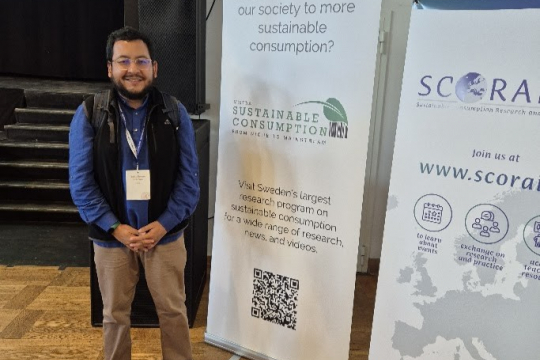What is needed to transform lifestyles towards sustainable models in the face of the climate crisis? This question guided discussions at the SCORAI 2025 conference, where EfD Central America and Mexico shared new evidence on public acceptance of behavioral changes needed for low-carbon living, particularly from the perspective of the Global South.
EfD Central America and Mexico (EfD CAM) participated in the SCORAI 2025 conference (Sustainable Consumption Research and Action Initiative), held on April 8–10 in Lund, Sweden. The event was co-organized by the MISTRA Sustainable Consumption and EU 1.5° Lifestyles projects.
The conference brought together more than 400 researchers, policymakers, and professionals committed to addressing the major challenges of sustainable consumption and production. Sessions and workshops focused on key themes such as transformative pathways, technological innovation, sustainable mobility, food systems, and the co-creation of knowledge.
Crucial to understand consumers’ perceptions
Pablo Evia, researcher at EfD CAM and coordinator of the SCOPE program (Sustainable Consumption and Production), presented findings from the study Attitudes towards adaptive changes in lifestyles during the session Charting the Course: Exploring Strategies and Pathways to 1.5° Lifestyles amid Deep Barriers to Transformation.
The study, conducted in collaboration with researchers from the University of Gothenburg, Wageningen University, EfD Vietnam, and EfD India, explores public acceptance of personal consumption changes—especially those involving individual costs—and how attitudes vary across social groups based on income level, gender, and geographic location.
“Tackling the climate crisis requires significant lifestyle changes, but also a deep understanding of how people perceive and respond to such changes,” said Pablo Evia during his presentation. These insights aim to inform more effective public policies that promote sustainable living while accounting for social differences.
Strengthening international collaboration
During his visit to Sweden, Pablo Evia also visited the EfD’s Global Hub in Gothenburg, where he joined a working session. This meeting strengthened the collaboration between EfD CAM and other EfD centers, supporting future joint research and solutions for sustainable consumption in the Global South.
By: Daniela Rivera
